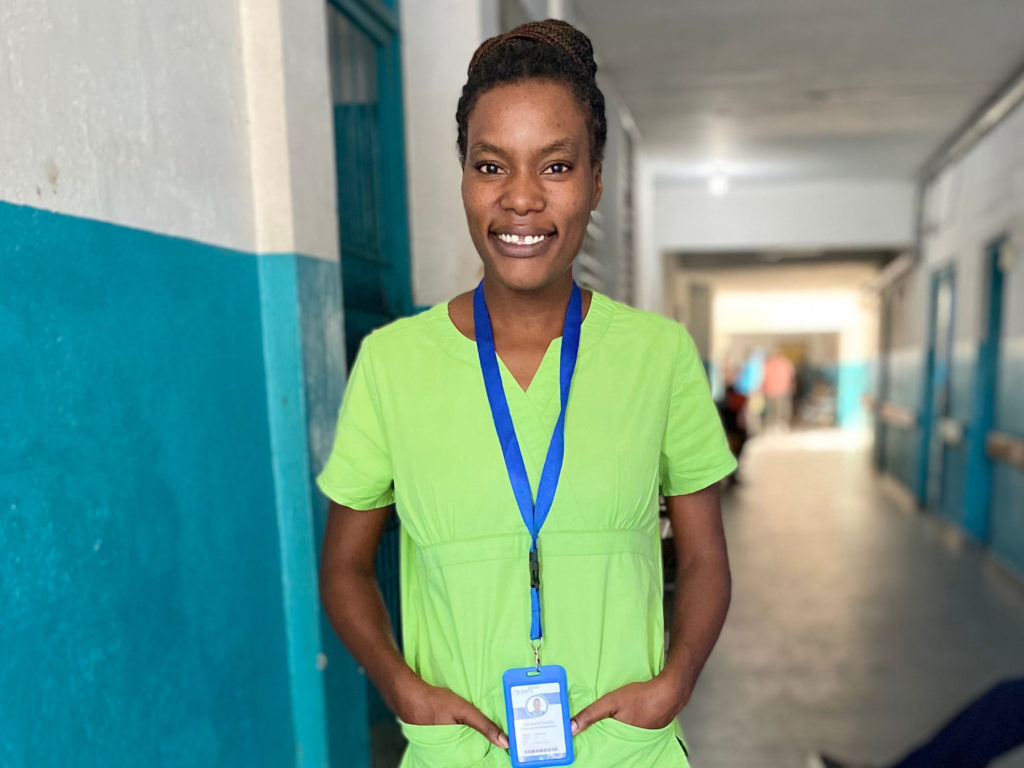Raised with NPH, giving back to NPH
Anabelle recently completed her first year as an occupational therapist, and she loves it.

She grew up from an early age at NPH Haiti. It took her a while to pin down her preferred area of work, but she always threw herself into everything with passion and energy.
She is enormously grateful to her godparents for the love and support they have given her.
Why did you decide to study occupational therapy?
After finishing my classical studies, I spent a year in service, at Sainte Germaine, located in Tabarre in a special school belonging to NPH, where there are children with reduced mobility. The work I was doing was voluntary, but I had no idea if what I was doing with the children encompassed a science, so Gena put the idea in my head. I was researching occupational therapy. It was in this context that I chose to study occupational therapy at a university in Léogane, because it was the only university that offered this course.
Was there anything else you wanted to do when you grew up?
Now that I have a bachelor’s degree in occupational therapy, I have a great desire to continue my studies abroad in order to enrich my knowledge, to help the faculty academically and to continue to serve the people of my country.
Could you tell me a little about where you grew up? Are you originally from Port-au-Prince?
Since I was a baby, I spent my entire childhood in an orphanage in Kenscoff, still run by NPH. I spent my entire school life there, from kindergarden to 9th grade, after which I left kenscoff to go and live in Tabarre, in another NPH home to continue my classical studies. Since I didn’t know my family, Kenscoff is my hometown, so yes, I’m originally from Port-au-Prince.
This year marks the end of your first year as a therapist. Where have you been working? What’s your day like?
I’m an occupational therapist in my third year, graduating in Haiti December 2022. I work in a therapy clinic in Léogane as a therapist and clinical supervisor. I’m there to supervise students when they come for internships; I accompany them when they make assessments, treatments and interventions for patients, in order to correct them. I do a mid-term and final evaluation for the students, and then send the documents to the internship coordinator.
What are your plans for the future?
I have many project but one I would like to realize is long-term, and that’s to set up an occupational therapy workshop. The aim is to facilitate occupational therapy treatment based on occupation and activities, to promote the profession, to show the public our role in the health field and to enable patients to be autonomous in the activities of daily life. Also, to show the importance of activity in the treatment of patients.
We know that Haiti is in a complicated situation at the moment, but you mentioned that it was important for you to stay in Haiti. Can you tell us more about that?
Actually, staying in Haiti requires a lot of courage, patience, perseverance and motivation. With the situation in the country, things are really difficult. There aren’t many rehabilitation professionals or therapy clinics in Haiti. Most rehabilitation clinics are built by foreigners. On top of all that, therapy is very much in demand in the country. In the clinic where I work, I mostly see stroke and fracture patients, because there are a lot of accidents on public roads. The population needs young professionals like me to reduce the risk of illness and help people to be independent in their daily activities.
In your experience, how important are the NPH sponsors? How have they supported you over the years?
The godparents are like biological parents. They take care of almost everything we need. Growing up at NPH was a great advantage and opportunity for me. With the support of my godparents, I’ve been able to achieve a lot. I want to emphasize education as a key to success. Without their help, I wouldn’t know what I’d become. Thanks to their help, I was able to finish all my classical studies and then I had the chance to go to university, pay for transport, rent, eat and enjoy the happiness of life without financial difficulties. Now I’m a self-sufficient, independent woman, thanks to the support of my godmothers and godfathers, who enabled me to become an occupational therapist today to serve the people of Haiti. Now I continue to follow the NPH path by helping my NPH sisters who are in financial difficulty. I’m so proud of myself, I’ll never stop thanking NPH, and I carry it in my heart every day.
Anything else you’d like to explain or mention?
One thing I would like to add is to find the possibility to representing NPH on the international channel as a Haitian to show its fruit and that the support I’ve been given is not in vain. I think it’s important because it will motivate other young NPH people to see my story and my career at NPH, and it will be a source of pride for the sponsors to continue supporting the organization’s young people.
